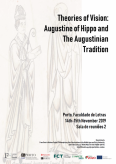Theories of Vision: Augustine of Hippo and the Augustinian Tradition

International Meeting
Theories of Vision: Augustine of Hippo and the Augustinian Tradition
Faculty of Arts and Humanities - University of Porto
14th and 15th November, 2019
Menti hoc est intelligere quod sensui videre (De ord., 2: 3, 10) - Understanding is to the mind what perceiving is to the bodily sense. This simple sentence -from one of Augustine's first dialogues- points out one of the keystones of his metaphysical system. In Augustine's theory of knowledge, sensorial vision is the model for intellectual vision, and both are correlated. This theory is an emblematic part of Augustine's philosophical project and it is based on Augustine's belief that all beings, their inner structure and their external links are formed by and committed to a relational framework. Hence, this framework is, unsurprisingly, also the basis of Augustine's explanation of human knowledge.
However, Augustine's theorizing and questioning required innumerable questions that became increasingly complex, both in the context of his own work and in the wider philosophical tradition of which it formed a part. Here are some of the key issues:
How is it possible to see material bodies by means of a non-material vision? Is the non-material vision still a bodily vision? If it isn't, how is it possible to validate the human knowledge of the bodily structure of the world? If this immaterial vision of material bodies is possible by means of imagination and memory, how can we differentiate between imaginary visual experiences in the state of vigil and those had while dreaming? Do they share the same origin? Is there any relationship between imagination and reason, and between both and the intellect? Is light, in the Augustinian view, a requirement for knowledge of the corporeal world and does it also illuminate the intelligible forms in the mind? What is the structure of the human knowledge when producing physical science? Is it the same for pure theoretical sciences, like mathematics and geometry? And what is the role of God in the process? Is he the supreme intelligible and the light of lights that illuminates the inner self? If so, is it possible for humans to produce a natural science of God? Furthermore, how is it possible for humans, in the beatific state of matter, to see the invisible God? Is it, in the end, wholly transcendent to humans and the created world?
This Meeting aims to offer a broader perspective on Augustine's theory of vision and its reception throughout the Middle Ages. As P. O. Lewry said about De spiritu phantastico of Robert Kilwardby, the Augustinian approach to the internal senses and their relationship with the external perception was enriched with Aristotelian elements. This task pursued a sort of balance between the «internal perception» of ontological notions and the «perceptual» influence of the divine light, of which there were several examples in the Middle Ages, particularly after the translation of the Aristotelian and Avicennian works on the soul.
Topics for discussion:
- Augustine's conception of the different types of vision and the Augustinian notion of the «Eye of the mind».
- Augustine and the Medieval notion of internal senses.
- The Medieval reception of De quantitate animae, De genesi ad litteram XII and De Trinitate VIII-IX.
- Visual experience and the comprehension of geometrical and linguistic representations.
- The relation between vision and other senses.
- Sensorial vision and the faculties of the soul.
- Visual experience in dreams and the states of imagination.
Programme
Guest Speakers:
Emmanuel Bermon (Université de Bordeaux-Montaigne)
Giovanni Catapano (Università degli Studi di Padova)
Lydia Schumacher (King's College London)
Organization:
Paula Oliveira e Silva (dir.) - José Higuera - Lídia Queiroz
Info.: https://ifilosofia.up.pt/activities/augustine-vision-2019
https://sigarra.up.pt/flup/pt/noticias_geral.ver_noticia?p_nr=94743

